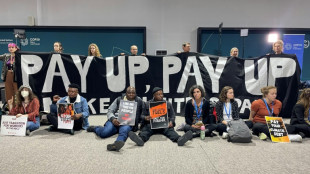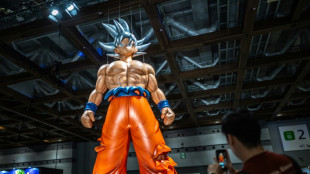
-
 General strike in Greece against cost of living
General strike in Greece against cost of living
-
UN nuclear chief welcomes Iran's 'concrete step' on uranium stockpile

-
 Floods to shave 0.2 percentage points off Spain's growth
Floods to shave 0.2 percentage points off Spain's growth
-
Argentina's Contepomi makes one change for France Test

-
 'Steep climb' ahead as clock ticks on stalled climate talks
'Steep climb' ahead as clock ticks on stalled climate talks
-
Gatland changes four for Wales clash with South Africa

-
 'Sport will have the last word' as WRC title goes down to the wire in Japan
'Sport will have the last word' as WRC title goes down to the wire in Japan
-
Western powers move to censure Iran at UN nuclear meet

-
 US envoy presses Israel-Hezbollah truce bid in Lebanon visit
US envoy presses Israel-Hezbollah truce bid in Lebanon visit
-
'No controversy' around Alldritt exclusion for Argentina Test

-
 Stock markets gain, dollar higher before Nvidia earnings
Stock markets gain, dollar higher before Nvidia earnings
-
New WHO financing mechanism put to the test

-
 Besigye kidnapping: Uganda president's doctor turned rival
Besigye kidnapping: Uganda president's doctor turned rival
-
Star K-pop producer of NewJeans quits after legal spat with BTS agency

-
 'Eternal' Nadal leaves legacy as he retires from tennis
'Eternal' Nadal leaves legacy as he retires from tennis
-
Vieira takes over at struggling Gerona

-
 Australia's Kerevi banned for Morgan tackle
Australia's Kerevi banned for Morgan tackle
-
Bellamy defies 'lunatic' reputation to inspire Wales revival

-
 Kremlin says US 'doing everything' to prolong 'war' in Ukraine
Kremlin says US 'doing everything' to prolong 'war' in Ukraine
-
Magritte painting nets auction record of $121 million

-
 Markets fluctuate as traders weigh geopolitical tensions
Markets fluctuate as traders weigh geopolitical tensions
-
N. Korea's latest weapon? Bombarding South with noise

-
 'Kidnapped' Uganda opposition figure Besigye to appear at military court: lawyer
'Kidnapped' Uganda opposition figure Besigye to appear at military court: lawyer
-
Asian markets fluctuate as traders weigh geopolitical tensions

-
 'An inauspicious day': the landmines ruining Myanmar lives
'An inauspicious day': the landmines ruining Myanmar lives
-
UN to vote again on Gaza ceasefire, US plans unclear

-
 Japan's manga powerhouse 'Dragon Ball' turns 40
Japan's manga powerhouse 'Dragon Ball' turns 40
-
Japanese, Koreans bottom of global love life survey

-
 Son blames 'mistakes' after South Korea held by Palestine in qualifier
Son blames 'mistakes' after South Korea held by Palestine in qualifier
-
Japan ramps up tech ambitions with $65 bn for AI, chips

-
 Lights, action, melodrama! Silent films get new reel at London haven
Lights, action, melodrama! Silent films get new reel at London haven
-
Myanmar led world in landmine victims in 2023: monitor

-
 ICC to sentence Timbuktu war criminal
ICC to sentence Timbuktu war criminal
-
Ugandan opposition figure Besigye 'kidnapped', says wife

-
 Australia's Jason Day eyes more major glory after resurgence
Australia's Jason Day eyes more major glory after resurgence
-
Machu Picchu security boosted after visitors spread human ashes

-
 Popovic hails Australia character in 'crazy' World Cup qualifier
Popovic hails Australia character in 'crazy' World Cup qualifier
-
Taliban govt clearing 'un-Islamic' books from Afghanistan shelves

-
 Argentina beat Peru as Uruguay hold Brazil
Argentina beat Peru as Uruguay hold Brazil
-
Asian markets struggle as traders weigh geopolitical tensions

-
 Tatum stars as Celtics end Cavaliers unbeaten start
Tatum stars as Celtics end Cavaliers unbeaten start
-
Hurting India under pressure in blockbuster five-Test Australia series

-
 'They killed her dream': Israel strike leaves woman footballer in coma
'They killed her dream': Israel strike leaves woman footballer in coma
-
Iraq holds its first census in nearly 40 years

-
 Iraqis face tough homecoming a decade after IS rampage
Iraqis face tough homecoming a decade after IS rampage
-
Russian net tightens around last civilians left in eastern Ukraine

-
 Olympic champion Tebogo aims to inspire next generation of African athletes
Olympic champion Tebogo aims to inspire next generation of African athletes
-
Valencia on target as ten-man Ecuador upset Colombia

-
 'Rust' to premiere three years after on-set shooting
'Rust' to premiere three years after on-set shooting
-
Strike at French cognac maker Hennessy over measures in China spat


Crises slowing economic growth worldwide: IMF chief
The war in Ukraine has undercut the global recovery, slowing expected economic growth in most countries in the world, IMF Managing Director Kristalina Georgieva said Thursday.
And beyond the humanitarian tragedy and economic crises, the war has exposed fractures in the international system at a time when global cooperation is the only solution, she said.
The war hit as the world was struggling to recover from the ongoing impact of the Covid-19 pandemic, and has caused an acceleration of inflation that endangers the gains of the past two years.
"To put it simply: we are facing a crisis on top of a crisis," Georgieva said in a speech ahead of the spring meetings of the IMF and World Bank.
"The economic consequences from the war spread fast and far, to neighbors and beyond, hitting hardest the world's most vulnerable people," she said.
Families already were struggling with higher energy and food prices and "the war has made this much worse."
The IMF is due to release its updated economic forecasts on Tuesday, which Georgieva said will further downgrade the estimate for global growth that was cut to 4.4 percent in January.
"Since then, the outlook has deteriorated substantially, largely because of the war and its repercussions," she said, and 143 countries will suffer downgrades.
While most will still achieve positive growth, the future is "extraordinarily uncertain," and she warned of a deep divide between rich and poor countries.
- 'Clear and present danger' -
After a decade of low inflation, prices worldwide have surged amid strong demand for goods that outstripped supply as economies began to return to normal, but the Russian invasion of Ukraine in late February and the sanctions imposed on Moscow pushed fuel and food prices up sharply.
Ukraine and Russia are major grain producers, and Russia also is a key source of energy for Europe.
"The root cause of what we face today is the war and it is the war that must end," Georgieva said in a discussion following her speech to the Carnegie Endowment for International Peace.
Inflation, which has hit a four-decade high the United States, "has become a clear and present danger," she said, noting the trend will likely last longer than expected.
"This is a massive setback for the global recovery," she said.
It also complicates policymaking: major central banks are raising interest rates to contain prices, but that increases borrowing costs for emerging markets and developing nations, which face high debt burdens.
"This is the most universally complex policy environment of our lifetime," she said.
- 'Fragmentation' -
Ending the war and the pandemic are top priorities, but can only be addressed through international cooperation, said Georgieva, who warned of the growing "fragmentation of the world economy into geopolitical blocs."
The IMF leader, who grew up in Cold War-era Bulgaria, lamented, "I have never thought that I would live to see another war in Europe of the magnitude of the tragedy that is happening in Ukraine."
She noted that the end of the Cold War ushered in "a new era of rapidly increasing prosperity... because of an integrated global economy."
Fractures in that system impair the ability to address the current crises and future challenges, but also could cause a "tectonic shift" that would reshape global supply chains.
"The threat to our collective prosperity from a breakdown in global cooperation cannot be overstated," she said.
W.Nelson--AT
